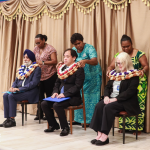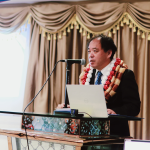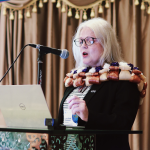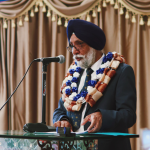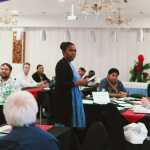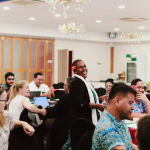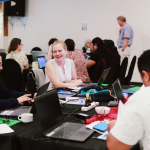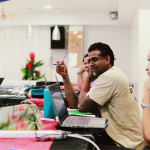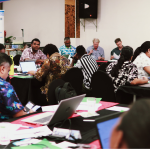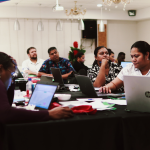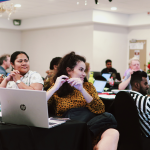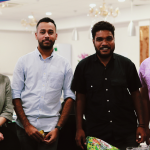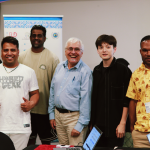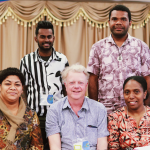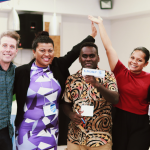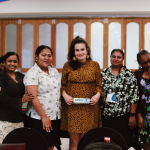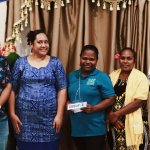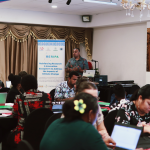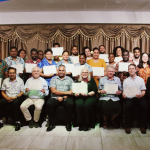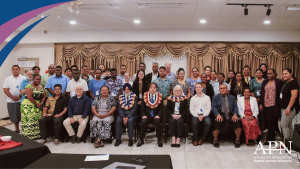
26-29 August, Suva, Fiji – Co-hosted by the University of the South Pacific and the Pacific Center for Environment and Sustainable Development (PaCE-SD), and officially endorsed by the UN Decade on Ocean Science for Sustainable Development (UNDOS), APN convened its first Proposal Development Training Workshop (PDTW) in the Pacific region, addressing the theme of “Global change research in the Pacific”. This immersive workshop aimed to equip early career researchers and practitioners with the skills and knowledge necessary to develop competitive regional research project proposals.
The PDTW provided a valuable opportunity for 30 trainees from nine countries (Cook Islands, Fiji, Japan, the Marshall Islands, New Zealand, Papua New Guinea, Samoa, the Solomon Islands, and Vanuatu) to collaborate on regional research proposal development face-to-face. Twenty early career professional trainees were joined by ten trainees from USP’s Research and Innovation Ecosystems to Address the Impact of Climate Change in the Pacific (RERIPA) Call 2 Project. Amongst regional- and gender-diverse teams, the 30 trainees were guided by five Pacific-based mentors, to enhance skills and perspectives on environmental challenges in the Pacific region. The trainers included APN National Focal Points, Scientific Planning Group Members, Invited Experts to the Steering Committee, past APN project leaders, and Pacific-based experts.
Over the course of the workshop, trainees engaged in hands-on experiences to identify research gaps in regional change in the Pacific, develop compelling research questions, design budgets and methodologies, and create effective narratives for their proposals. To simulate a real-life grant proposal submission process, trainees conducted mock exercises and used the APN Information System (APNIS) to submit their proposals.
The mock summary proposals which were developed and submitted by the trainee groups throughout the week included:
- Putting communities in the forefront of enhancing marine protected areas through coral-focused adaptation: Case studies in Fiji, Kiribati, and Papua New Guinea
- Developing an integrated knowledge tool for the management of coastal forest biodiversity and food systems: An interdisciplinary approach to the restoration and wellbeing of coastal socio-ecological systems
- The implications of tropical cyclones on food security, and the roles of gender in Fiji, Cook Islands, Vanuatu, and the Solomon Islands in recovery and response
- Circular economy instead of throwaway society: Converting plastic into biofuel in rural and urban coastal areas
- Food security resilience and adaptation in Pacific remote communities
- Creating a centralised database of agricultural traditional and Indigenous knowledge practices in Fiji, Solomon Islands, and Samoa
Interactive Session: Effective communication and the utilisation of traditional and indigenous local knowledge (TILK)
The PDTW featured an interactive panel discussion with the mentors engaged during the workshop, demonstrating regional considerations in utilising TILK and effective communication in research implementation.
The participating speakers from the PDTW mentors included:
- Dr Awnesh Singh, University of the South Pacific (Fiji)
- Dr Chris Jacobson, University of Queensland (Australia)
- Dr Douglas Hill, University of Otago (New Zealand)
- Dr Gilbert David, Research Institute for Development (France)
- Dr Lance Heath, FreeLance Solutions (Australia)
The key takeaways for regional research considerations in the Pacific region emphasise the importance of integrating Indigenous knowledge as a holistic philosophy rather than merely a data source. Researchers should be encouraged to approach traditional knowledge with respect, recognising its spiritual and cultural significance, and work towards decolonising research methodologies to align better with Pacific worldviews. Flexibility in research design is essential to accommodate community feedback and needs.
Furthermore, understanding and complying with local research permit requirements is crucial, in accordance with Free, Prior, and Informed Consent (FPIC) principles. Researchers should coordinate efforts to avoid over-consultation and duplication while ensuring that findings are communicated back to communities in meaningful ways. Effective communication of research involves identifying and engaging key stakeholders throughout the process, bridging the science-policy gap through continuous dialogue, and considering direct communication with high-level decision-makers when appropriate.
Above all, collaboration was emphasised as vital; researchers should prioritise building long-term relationships with Pacific communities, respecting Indigenous structures and protocols in their collaborative efforts. Addressing potential gaps between international NGO approaches and local community expectations is also important. Ultimately, researchers must adjust their timelines and methodologies to align with community needs and cultural norms, recognising the significance of land and sea in Pacific cultures as they incorporate this understanding into their research approaches.
Introducing the Asia-Pacific Network for Early Career Professionals (APN-ECAP)
During the Pacific PDTW, the APN Secretariat took the opportunity to introduce the early APN-ECAP initiative and its ambitions to connect global change researchers across the Asia-Pacific region. Dr Saurav K.C. from the Center of Research for Environment, Energy, and Water (CREEW) presented an overview of the network initiative, and invited the PDTW trainees to join a focus group discussion in September to gather perspectives and feedback on engaging researchers in the Pacific region.
As part of the session, a Mentimeter survey was conducted to hear the early interests and needs of Pacific-based early career researchers, and their existing experiences with Pacific-based networking groups. Examples included the South Pacific Community ECOPs, the Fiji Locally Managed Marine Area Network, SPREP, the Australian Center for Pacific Islands Resarch, UN Women in the Pacific, and the NZ Development Network.
Way forward
The Pacific PDTW in Suva, Fiji, demonstrated a significant first step towards building regional collaboration and network-building in the Pacific. It offered a supportive and engaging environment for early career professionals to develop proposals, establish professional relationships, and acquire the necessary tools and knowledge for effectively addressing regional sustainability challenges. With the 2024 Call for Proposals launching in November, all trainees have been encouraged to submit regional research proposals with their diverse teams in the coming months.
Testimonials
“I was particularly impressed with the way the workshop was structured, especially the decision to divide participants into groups and have us work offline. This approach fostered an open environment for collaboration, allowing participants to exchange ideas and build knowledge together while working through tasks under your guidance.”
- PDTW Trainee, UN Women Vanuatu
“Engaging with peers from across the Pacific allowed for rich collaboration and the exchange of diverse perspectives through research. Having senior mentors provided valuable guidance, while networking expanded my understanding of regional challenges and solutions.”
- PDTW Trainee, Fiji National University
“The most valuable learning experience of the Pacific PDTW is the mock exercise which really helped participants to develop constructive ideas and contribute to the proposal exercise. The exercise puts into reality the process of applying for funding from donor partners.”
- PDTW Trainee, World Fish Solomon Islands
“I am thrilled that our team from the Pacific PDTW is currently working on refining our submission for coral reef research in the region, for CRRP or CAPaBLE funding. I am hopeful that we will be able to submit a proper proposal by November.”
- PDTW Trainee, College of the Marshall Islands
“The collective presentations, feedback, advice, and practical activities throughout the workshop have built my confidence and helped me a lot in framing my research proposal. The networking and collaborative aspect of the PDTW reinforced our commitment as Pacific islands to work together to ensure transformative change amidst the challenges in finance and resources.”
- PDTW Trainee, University of the South Pacific
“The PDTW was inspiring and re-energised me as a researcher and development practitioner. This compact intensive workshop enabled rapid development of ideas and provided understanding of the determinants of successful proposals, with solid proposal development over 4-days. These workshops are essential, as our Pasifika counterparts have an unparalleled understanding of their communities needs, the issues they face and appropriate pathways to impact. They must therefore must be encouraged to lead research in the region. the PDTW is designed to enhance skills and build confidence in doing so.”
- PDTW Mentor, University of Queensland
Other news
- USP Event Report: https://www.usp.ac.fj/news/early-careers-researchers-undertake-research-proposals-workshop/
